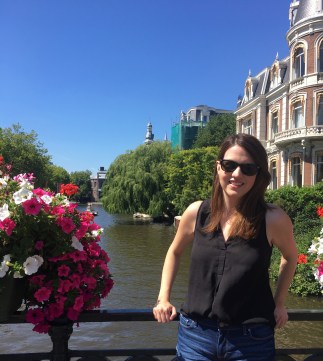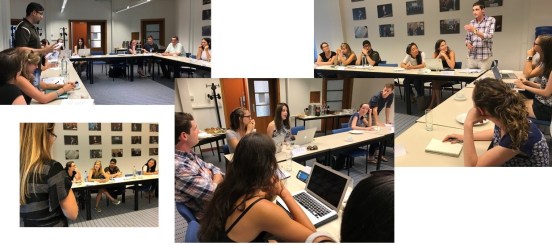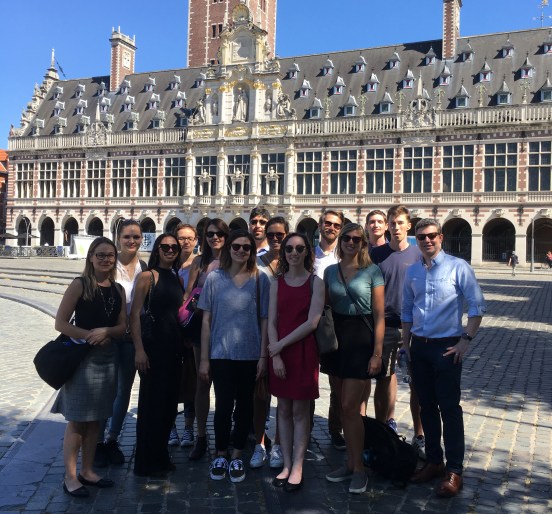
Yesterday’s sessions of our Georgia Law-Leuven Centre Global Governance Summer School were devoted to a new, 4-year research project aimed at reinvigorating core values of the European Union.
Called RECONNECT: Reconciling Europe with its Citizens through Democracy and the Rule of Law and supported by funds from the EU’s Horizon 2020 Research & Innovation programme, the project has just been established by KU Leuven’s Leuven Centre for Global Governance Studies and 17 partner institutions.
 Our summer school’s morning began at a classroom in Leuven, where Michal Ovádek (left), a Leuven Centre PhD candidate and research fellow, provided an introduction to the structure of, and contemporary challenges, to European Union integration. Among them are the efforts of recently elected governments to undermine judicial independence, free press, and other democratic institutions in Poland and Hungary, as well as the aftermath of the 2016 Brexit referendum, in which a slight majority in the United Kingdom voted to leave the EU.
Our summer school’s morning began at a classroom in Leuven, where Michal Ovádek (left), a Leuven Centre PhD candidate and research fellow, provided an introduction to the structure of, and contemporary challenges, to European Union integration. Among them are the efforts of recently elected governments to undermine judicial independence, free press, and other democratic institutions in Poland and Hungary, as well as the aftermath of the 2016 Brexit referendum, in which a slight majority in the United Kingdom voted to leave the EU.
We then traveled to Brussels’ neoclassical Academy Palace, home to the Royal Flemish Academy of Belgium for Science and the Arts and the site of an afternoon conference launching the RECONNECT project.
Leuven Law Professor Jan Wouters, whose many titles include Director of the Leuven Centre for Global Governance Studies and Co-Director of our summer school, opened the conference (top photo). Stating that “the EU and its members are confronted with an existential crisis,” Wouters explained how “RECONNECT will intervene in the public discourse, to build a new narrative for Europe.” The EU can “regain authority and legitimacy through democracy and the rule of law,” he said, “provided citizens’ views taken into account.”
Delivering keynotes were H.E. Didier Reynders, Belgium’s Deputy Prime Minister and Minister of Foreign Affairs & European Affairs – who urged, as a way to reconnect, emphasizing that the EU is not just an economic project, but also based on values and principles – and Dr. Adam Bodnar, Ombudsman of the Republic of Poland.
Two policy roundtables followed:
► “Strengthening Democracy in the European Union,” chaired by Julie Smith and featuring Alberto Alemanno, Richard Youngs, Zselyke Csaky, Vivien Schmidt, Carlos Closa Montero, and Amichai Magen.
► “Addressing Rule of Law Challenges in the EU,” chaired by Laurent Pech and including Tamas Lukacsi, Philip Bittner, Peter Claes, Lotte Leicht, Petra Bárd, and Dimitry Kochenov.
Many speakers revisited developments in countries like Hungary, Poland, and post-Brexit UK, touching on issues ranging from freedom of speech to social media, economic anxiety and political processes. Europe’s responses to global migration both within and outside its borders, was another topic frequently mentioned.
 In a particularly moving presentation, Lotte Leicht (3d from right), EU Director for Human Rights Watch, told of seeing, at a middle school where she recently spoke, signs saying “Be Kind” and “Treat One Another as You Want to Be Treated.” Commenting that youths “get it,” she proceeded to outline problems and to welcome innovative solutions. Yet Leicht cautioned against adopting perceived solutions that would have negative effects:
In a particularly moving presentation, Lotte Leicht (3d from right), EU Director for Human Rights Watch, told of seeing, at a middle school where she recently spoke, signs saying “Be Kind” and “Treat One Another as You Want to Be Treated.” Commenting that youths “get it,” she proceeded to outline problems and to welcome innovative solutions. Yet Leicht cautioned against adopting perceived solutions that would have negative effects:
“It is a redline when we start undermining the rule of law and our obligations under international law.”
Our stay in Leuven concludes tomorrow, after sessions on related to human rights and security governance – and, fittingly, after tomorrow night’s World Cup contest between Belgium and Brazil.




 During my externship, I worked closely with SPREP’s legal counsel, and participated in various projects on topics like preventing the practice of shark finning and banning the use of non-reusable plastics. My most extensive assignment related to the implementation of the
During my externship, I worked closely with SPREP’s legal counsel, and participated in various projects on topics like preventing the practice of shark finning and banning the use of non-reusable plastics. My most extensive assignment related to the implementation of the  The opportunity to work on biodiversity was amplified by the chance to do so in Samoa. When I wasn’t working, I spent the summer exploring the natural wonders of the small island nation. Consisting of two main islands – Upolu and Savai’i – and eight small inlets, Samoa boasts an extensive coral reef ecosystem, pristine beaches, massive waterfalls, and miles upon miles of coconut trees. It is also home to 200,000 people, who keep alive one of the world’s oldest cultures. Family and community are integral to the Samoan way of life, and Samoans take great pride in maintaining traditions that have been passed down for thousands of years. One of these, familiar around the world, is the Samoan art of
The opportunity to work on biodiversity was amplified by the chance to do so in Samoa. When I wasn’t working, I spent the summer exploring the natural wonders of the small island nation. Consisting of two main islands – Upolu and Savai’i – and eight small inlets, Samoa boasts an extensive coral reef ecosystem, pristine beaches, massive waterfalls, and miles upon miles of coconut trees. It is also home to 200,000 people, who keep alive one of the world’s oldest cultures. Family and community are integral to the Samoan way of life, and Samoans take great pride in maintaining traditions that have been passed down for thousands of years. One of these, familiar around the world, is the Samoan art of  After completing my internship with SPREP and returning to campus this fall, I was pleased to be selected by the
After completing my internship with SPREP and returning to campus this fall, I was pleased to be selected by the  While I knew that I was interested in international environmental law, before this summer I had never heard of the Nagoya Protocol. Now, I have an understanding of the contracts that govern access to genetic resources, and of their value to indigenous communities. I also built a network of professionals doing great work to advance this initiative. I am incredibly grateful for my time in Samoa and at the UN, and am excited to build on these experiences to pursue the conservation of biodiversity around the world for the benefit of generations to come.
While I knew that I was interested in international environmental law, before this summer I had never heard of the Nagoya Protocol. Now, I have an understanding of the contracts that govern access to genetic resources, and of their value to indigenous communities. I also built a network of professionals doing great work to advance this initiative. I am incredibly grateful for my time in Samoa and at the UN, and am excited to build on these experiences to pursue the conservation of biodiversity around the world for the benefit of generations to come. This is one in a series of posts by University of Georgia School of Law students, writing on their participation in our
This is one in a series of posts by University of Georgia School of Law students, writing on their participation in our 


 Our Georgia Law students, who spent last week at the
Our Georgia Law students, who spent last week at the 



 The week’s classroom component concluded with a lecture on “Global Governance, International Law and Informal Lawmaking in Times of Antiglobalism and Populism” by Leuven Professor
The week’s classroom component concluded with a lecture on “Global Governance, International Law and Informal Lawmaking in Times of Antiglobalism and Populism” by Leuven Professor 

 Our summer school’s morning began at a classroom in Leuven, where
Our summer school’s morning began at a classroom in Leuven, where  In a particularly moving presentation,
In a particularly moving presentation, 
 rights
rights a well-known lawyer expert in matters related to EU competition (in effect, antitrust) law and trade law. Assisting in the presentation by Spinks (standing, at left) were 4 additional Sidley lawyers. From left: Dr.
a well-known lawyer expert in matters related to EU competition (in effect, antitrust) law and trade law. Assisting in the presentation by Spinks (standing, at left) were 4 additional Sidley lawyers. From left: Dr. 

 2d, Georgia Law Professor
2d, Georgia Law Professor  3d, Leuven Law Professor
3d, Leuven Law Professor  4th, Dr.
4th, Dr. 
 1st, yours truly, Georgia Law Professor
1st, yours truly, Georgia Law Professor  3d, Georgia Law Professor
3d, Georgia Law Professor